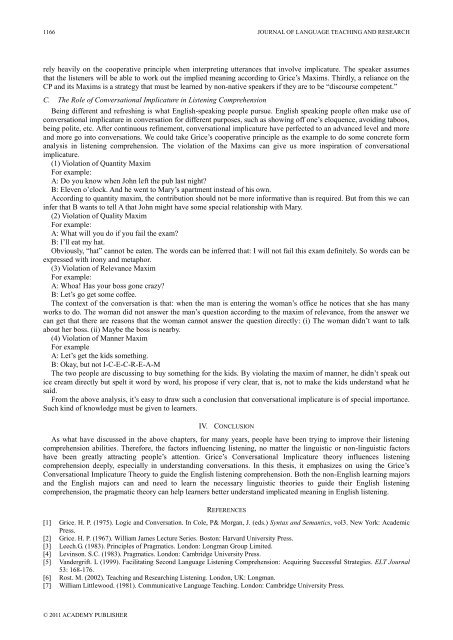Journal of Language Teaching and Research Contents - Academy ...
Journal of Language Teaching and Research Contents - Academy ...
Journal of Language Teaching and Research Contents - Academy ...
You also want an ePaper? Increase the reach of your titles
YUMPU automatically turns print PDFs into web optimized ePapers that Google loves.
1166<br />
© 2011 ACADEMY PUBLISHER<br />
JOURNAL OF LANGUAGE TEACHING AND RESEARCH<br />
rely heavily on the cooperative principle when interpreting utterances that involve implicature. The speaker assumes<br />
that the listeners will be able to work out the implied meaning according to Grice’s Maxims. Thirdly, a reliance on the<br />
CP <strong>and</strong> its Maxims is a strategy that must be learned by non-native speakers if they are to be “discourse competent.”<br />
C. The Role <strong>of</strong> Conversational Implicature in Listening Comprehension<br />
Being different <strong>and</strong> refreshing is what English-speaking people pursue. English speaking people <strong>of</strong>ten make use <strong>of</strong><br />
conversational implicature in conversation for different purposes, such as showing <strong>of</strong>f one’s eloquence, avoiding taboos,<br />
being polite, etc. After continuous refinement, conversational implicature have perfected to an advanced level <strong>and</strong> more<br />
<strong>and</strong> more go into conversations. We could take Grice’s cooperative principle as the example to do some concrete form<br />
analysis in listening comprehension. The violation <strong>of</strong> the Maxims can give us more inspiration <strong>of</strong> conversational<br />
implicature.<br />
(1) Violation <strong>of</strong> Quantity Maxim<br />
For example:<br />
A: Do you know when John left the pub last night?<br />
B: Eleven o’clock. And he went to Mary’s apartment instead <strong>of</strong> his own.<br />
According to quantity maxim, the contribution should not be more informative than is required. But from this we can<br />
infer that B wants to tell A that John might have some special relationship with Mary.<br />
(2) Violation <strong>of</strong> Quality Maxim<br />
For example:<br />
A: What will you do if you fail the exam?<br />
B: I’ll eat my hat.<br />
Obviously, “hat” cannot be eaten. The words can be inferred that: I will not fail this exam definitely. So words can be<br />
expressed with irony <strong>and</strong> metaphor.<br />
(3) Violation <strong>of</strong> Relevance Maxim<br />
For example:<br />
A: Whoa! Has your boss gone crazy?<br />
B: Let’s go get some c<strong>of</strong>fee.<br />
The context <strong>of</strong> the conversation is that: when the man is entering the woman’s <strong>of</strong>fice he notices that she has many<br />
works to do. The woman did not answer the man’s question according to the maxim <strong>of</strong> relevance, from the answer we<br />
can get that there are reasons that the woman cannot answer the question directly: (i) The woman didn’t want to talk<br />
about her boss. (ii) Maybe the boss is nearby.<br />
(4) Violation <strong>of</strong> Manner Maxim<br />
For example<br />
A: Let’s get the kids something.<br />
B: Okay, but not I-C-E-C-R-E-A-M<br />
The two people are discussing to buy something for the kids. By violating the maxim <strong>of</strong> manner, he didn’t speak out<br />
ice cream directly but spelt it word by word, his propose if very clear, that is, not to make the kids underst<strong>and</strong> what he<br />
said.<br />
From the above analysis, it’s easy to draw such a conclusion that conversational implicature is <strong>of</strong> special importance.<br />
Such kind <strong>of</strong> knowledge must be given to learners.<br />
IV. CONCLUSION<br />
As what have discussed in the above chapters, for many years, people have been trying to improve their listening<br />
comprehension abilities. Therefore, the factors influencing listening, no matter the linguistic or non-linguistic factors<br />
have been greatly attracting people’s attention. Grice’s Conversational Implicature theory influences listening<br />
comprehension deeply, especially in underst<strong>and</strong>ing conversations. In this thesis, it emphasizes on using the Grice’s<br />
Conversational Implicature Theory to guide the English listening comprehension. Both the non-English learning majors<br />
<strong>and</strong> the English majors can <strong>and</strong> need to learn the necessary linguistic theories to guide their English listening<br />
comprehension, the pragmatic theory can help learners better underst<strong>and</strong> implicated meaning in English listening.<br />
REFERENCES<br />
[1] Grice. H. P. (1975). Logic <strong>and</strong> Conversation. In Cole, P& Morgan, J. (eds.) Syntax <strong>and</strong> Semantics, vol3. New York: Academic<br />
Press.<br />
[2] Grice. H. P. (1967). William James Lecture Series. Boston: Harvard University Press.<br />
[3] Leech.G. (1983). Principles <strong>of</strong> Pragmatics. London: Longman Group Limited.<br />
[4] Levinson. S.C. (1983). Pragmatics. London: Cambridge University Press.<br />
[5] V<strong>and</strong>ergrift. L (1999). Facilitating Second <strong>Language</strong> Listening Comprehension: Acquiring Successful Strategies. ELT <strong>Journal</strong><br />
53: 168-176.<br />
[6] Rost. M. (2002). <strong>Teaching</strong> <strong>and</strong> <strong>Research</strong>ing Listening. London, UK: Longman.<br />
[7] William Littlewood. (1981). Communicative <strong>Language</strong> <strong>Teaching</strong>. London: Cambridge University Press.

















